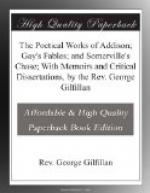John Gay had his faults as a man and as a poet, and it were easy finding fault with him in both capacities. But
“Poor were the triumph o’er the timid hare;”
and he was, by his own shewing, as well as Queen Caroline’s, “the Hare with many friends.” Let us, instead, drop a “tear over his fate,” and pay a tribute, short, but sincere, to his true, though limited genius.
GAY’S FABLES.
* * * * *
INTRODUCTION.
PART I.
THE SHEPHERD AND THE PHILOSOPHER.
Remote from cities lived a swain,
Unvexed with all the cares of gain;
His head was silvered o’er with
age,
And long experience made him sage;
In summer’s heat, and winter’s
cold,
He fed his flock and penned the fold;
His hours in cheerful labour flew,
Nor envy nor ambition knew:
His wisdom and his honest fame
Through all the country raised his name.
10
A deep philosopher (whose
rules
Of moral life were drawn from schools)
The shepherd’s homely cottage sought
And thus explored his reach of thought:
’Whence is thy
learning? Hath thy toil
O’er books consumed the midnight
oil?
Hast thou old Greece and Rome surveyed,
And the vast sense of Plato weighed?
Hath Socrates thy soul refined,
And hast thou fathomed Tully’s mind?
20
Or like the wise Ulysses, thrown
By various fates, on realms unknown,
Hast thou through many cities strayed,
Their customs, laws, and manners weighed?’




